
The University of Buenos Aires is a public research university in Buenos Aires, Argentina. It was established in 1821. It has educated 17 Argentine presidents, produced four of the country's five Nobel Prize laureates, and is responsible for approximately 40% of the country's research output.
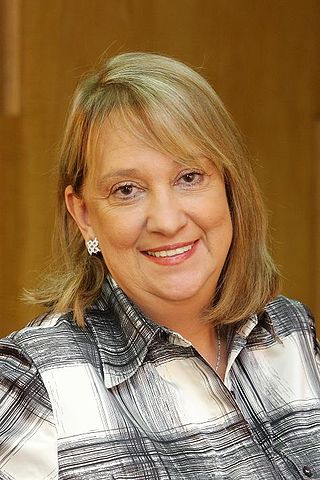
Noemí Rial was an Argentine lawyer and politician who was Secretary of Labour and Vice Minister of Labour, Employment and Social Security from 2002 to 2015. She was appointed by former President Eduardo Duhalde (2002–2003) and confirmed by presidents Néstor Kirchner (2003–2007) and Cristina Fernández, elected in 2007.
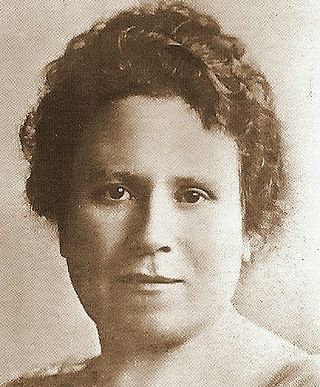
Julieta Lanteri was an Argentine physician, leading freethinker, and activist for women's rights in Argentina as well as for social reform generally.
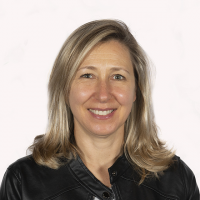
Myriam Bregman is an Argentine lawyer, activist, and politician. Raised in a Jewish family, Bregman joined the Socialist Workers' Party (PTS) – a Trotskyist Argentine party of which she is among the most prominent members – while studying a degree in law at the University of Buenos Aires in the 90s.

María Angélica Barreda became in 1910 the first woman admitted to practice law in Argentina. She graduated from the National University of La Plata, receiving her degree on 28 December 1909.
Alicia Daneri Rodrigo is an Argentine Egyptologist who earned a doctorate at the Universidad de Buenos Aires.

Sonia Berjman is an urban and landscape historian, researcher on the history of Buenos Aires public space and protector of parks, squares, and public green spaces of that city, she is a acknowledged referent for these issues.

Dora Beatriz Barrancos is an Argentine researcher, sociologist, historian, feminist, and politician.

Elisa Beatriz Bachofen was the first female civil engineer in Argentina and Latin America.
Élida Passo (1867–1893) was an Argentine pharmacist, the first woman to practice that profession in her country and the first woman university graduate in South America.

Delfina Manuela Molina y Vedia de Bastianini was an Argentine chemist, writer, teacher, painter, and singer. She was the first woman to graduate from the Faculty of Exact and Natural Sciences at the University of Buenos Aires (UBA).
Inés Angela Camilloni is an Argentine climatologist, specializing in climate change in South America. She is a professor at the University of Buenos Aires and an independent researcher at the Center for Research on the Sea and Atmosphere. She is also the academic secretary of the Faculty of Exact and Natural Sciences of the UBA. Camilloni is a resident in the Solar Geoengineering Research Program of Harvard University and director of the Master's in Environmental Sciences at the Faculty of Exact and Natural Sciences of the UBA.
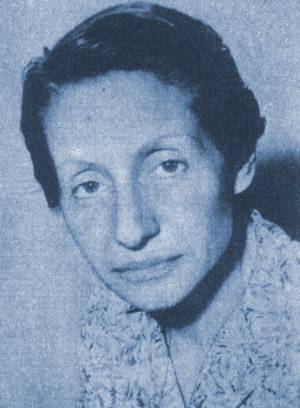
Alcira de la Peña was an Argentine physician and political leader. She became an important figure within the country's communist, feminist, and human rights movements.

Mirta Zaida Lobato is an Argentine historian, essayist, and full professor specializing in the social, cultural and political history of the world of work and gender relations in Argentina and Latin America in the 20th century. Lobato was the founder of "Área Interdisciplinaria de Estudios de la Mujer" (AIEM). She was awarded a Guggenheim Fellowship in 2006.

The Faculty of Medical Sciences, formerly and commonly known as the Faculty of Medicine, is the medical school of the University of Buenos Aires (UBA), the largest university in Argentina. Established in 1822 as one of the UBA's earliest divisions, FMED is presently the largest medical school in Argentina, with over 24,000 enrolled students as of 2011.

The Faculty of Veterinary Sciences, also simply known as Veterinaria, is a faculty of the University of Buenos Aires (UBA), the largest university in Argentina. It was founded as an autonomous faculty in 1972, when it was split from the Faculty of Agronomy and Veterinary Sciences, which was originally founded in 1904 as the Instituto Superior de Agronomía y Veterinaria.

The Faculty of Philosophy and Letters, also known as Filo, is a faculty of the University of Buenos Aires (UBA). The faculty was founded in 1896, making it one of the oldest faculties at the university. It offers graduate degrees in multiple subjects including philosophy, literature, anthropology, history, arts, education, geography, modern and classical languages, and literary editing, as well as post-graduate degrees at the magister, doctoral, and post-doctoral level.

The Faculty of Engineering is a faculty of the University of Buenos Aires (UBA), the largest university in Argentina. It offers graduate courses on various fields of engineering, including civil engineering, computer science and engineering, mechanical engineering, electronic engineering, naval engineering, among others. It also offers graduate courses on system analysis, as well as post-graduate degrees on the magister, doctoral and post-doctoral levels.
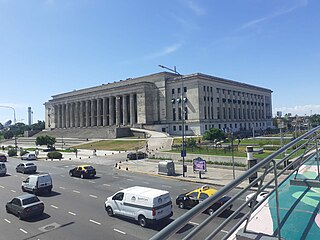
The Faculty of Law is a faculty of the University of Buenos Aires (UBA), the largest university in Argentina. It was founded alongside the university in 1821, and has consistently remained one of its largest constituent schools, presently counting with 23,790 enrolled graduate students. At the graduate level, it offers law degrees as well as legal translation and forensic calligraphy degrees, in addition to the professorship on judicial sciences.
Nora Domínguez is a full professor of literary theory at the University of Buenos Aires. She was a co-founder of the Instituto Interdisciplinario de Estudios de Género at the University of Buenos Aires, which introduced gender studies as an academic field in 1992. Between 2010 and 2017, she was the director of the institute. Her book De dónde vienen los niños. Maternidad y escritura en la cultura argentina won the Essay Prize from the National Arts Foundation. In 2021, she published El revés del rostro. Figuras de la exterioridad en la cultura argentina, which won the Humanities Prize for the Southern Cone from the Latin American Studies Association in 2022. She is currently directing a six-volume work to compile the series Historia feminista de la literatura argentina. The first volume in the series was released in 2020.
















